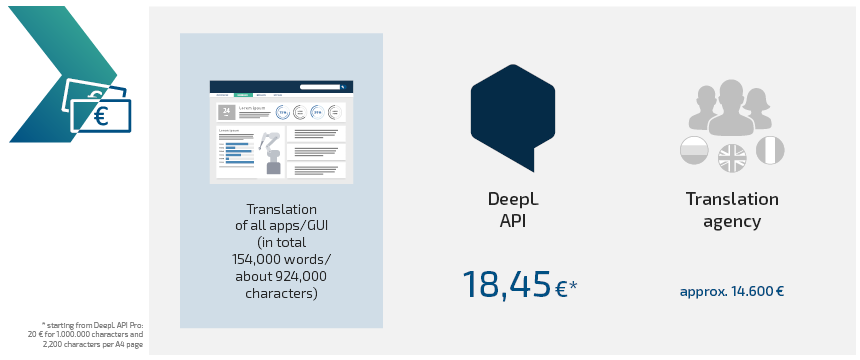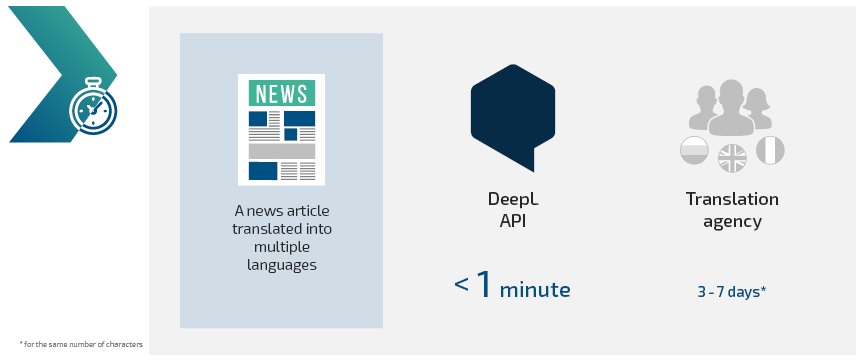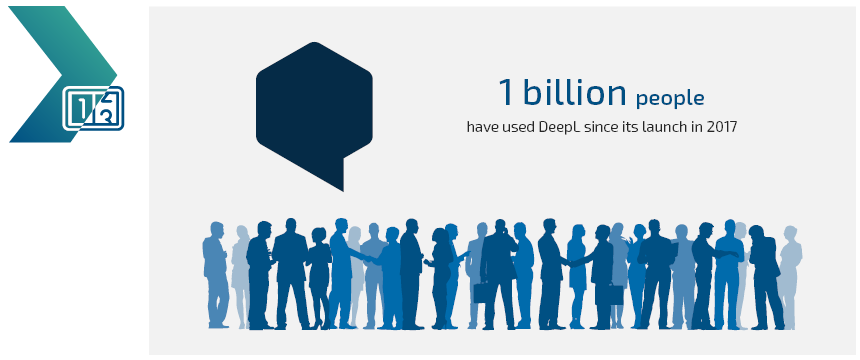Proactive customer service in mechanical engineering means offering customers from all over the world an exceptional service experience. Although English is the go-to language for conducting business today, it can be an indispensable advantage, especially in a technical environment, to communicate in your mother tongue. That is why we have created our new translation functionality, which enables mechanical engineering companies not only to offer the user interface (GUI) of their customer portal in various local languages, but also to provide checklists, maintenance schedules, emails, master data, machine states, KPI models and other content in the same language. This helps you to communicate clearly and to provide support quickly and comprehensibly.
Globally active mechanical engineering companies are faced with the challenge of having to provide documentation in the local language when delivering and commissioning their machines. With the volume and scope of documentation such as manuals, assembly and operating instructions, data sheets, service and training documents, software documentation and parts lists, this can quickly become very complex, time-consuming and cost-intensive. This is made even more difficult because of the pressure to complete the documentation in time for final acceptance. But it doesn't stop there: Operators and mechanical engineering companies are still in close contact after the machine has gone into operation, particularly if customers have purchased long-term maintenance contracts.
The hubs at the center of this continuous exchange of information are digital customer portals. They serve as a central point of contact for the customer’s operators and the mechanical engineering company’s service team. In addition to written documentation, mechanical engineering companies also want to provide their customers with additional information in the local language such as machine master data, service requests, ticket systems and knowledgebases. Firstly, this makes it easier to customize the portal to the customer’s needs, and secondly, it is now possible to communicate clearly in order to avoid misunderstandings and be able to process service orders efficiently.
To set up customer portals successfully in mechanical engineering means that they must be multilingual and that the underlying software can support this functionality without too much additional work.
Medium-sized mechanical engineering companies are currently faced with the fact that they have to hire external agencies to translate texts. Although native-speaking translation professionals do high-quality work, both the time it takes to do the translation and the costs involved can present enormous challenges for small to medium-sized mechanical engineering companies to provide a multilingual customer portal on their own.
In view of these challenges, Kontron AIS has decided to integrate the DeepL translation service into its EquipmentCloud® digital transformation solution to provide accurate, cost-effective and instant translation into over 28 languages.
What began as a bilingual system has evolved into a comprehensive translation functionality with far-reaching effects on the entire platform, offering significant benefits to both mechanical engineering companies and operators. This not only enables communication without borders worldwide, but also lays the foundation for a constantly growing selection of languages. Here you can find out how this new functionality was created and what benefits it offers.
How the Translation Functionality Was Created
Big ideas often start on a small scale, but can develop into having enormous consequences. That was also the case with the new translation functionality. Originally, EquipmentCloud® was only available in English. In order to be able to serve the German-speaking market in particular, the free GIT project Transapex was introduced five years ago, which enabled error-free translation of GUI elements into German.
With the introduction of the dashboard and its increased use as a customer portal, the demand for additional languages has increased because most mechanical engineering companies operate globally. That is why in 2022, DeepL was integrated into the Transapex system to make it possible to translate the GUI into more languages without too much additional work. The translation of customer-specific content added another, even more complex level. This could not be covered by Transapex, so instead is processed at tenant database level to achieve even more independence from the system language and give users as much freedom as possible. Manual and machine translation using the DeepL API was therefore launched in 2023 and has been subject to continuous development since then.
Developer Kornelia Dreyer says: "With the dynamic translation of the KnowledgeBase, we give users complete freedom to choose the language in which the KnowledgeBase is built. During development with test scenarios, we took into account all possible use cases, regardless of where the user works and what level of background knowledge they have. We've developed fallbacks so that content can be dynamically translated from any source language to any target language.
This gives EquipmentCloud® a unique selling point that only a few other software solutions offer in this depth. But what does that mean specifically for your company and your customers?
What Are the Advantages of the Translation Functionality?
Advantages for mechanical engineering companies:
- No need for an external translation agency anymore
- No more long waiting times because content is translated almost in real time
- Number of languages on offer continues to expand (DeepL currently supports 28+ languages)
- High-quality automatic translation thanks to the DeepL API
- Low translation costs because it is invoiced per API call
- Now information only needs to be prepared in one source language
- Glossary and configuration for manual or machine translation
Advantages for machine operators:
- Easy communication for service, support and after-sales in their local language
- Avoids language barriers and misunderstandings
- No waiting times for immediate access to relevant information in preferred language
With the help of this translation functionality, you can provide a multilingual customer portal in no time
Good and proactive communication is key
By using multilingual system emails, mechanical engineering companies can effectively inform their customers in good time about changes, important updates and upcoming maintenance. This involves the customer in the process right from the start and creates the basis for transparent communication.
As a mechanical engineering company, you can create multilingual news articles regarding your digital services, new products or upcoming events once in the source language, and then translate them into any target language with just a few clicks. That is how to always keep customers proactively informed.
Another thing that should not be missing in a customer portal are the data protection regulations and the legal imprint notice. These can also be made available in the required languages.
Use clear instructions to design efficient processes, prevent errors and support employees
The multilingual creation and planning of checklists simplifies communication and shortens the exchange of information by translating all elements, from the designation to the categories, the group name, the task description through to the parameter selection list and the parameters themselves.
Snippets, which are used as templates for open points or journals, make it possible to query information in a structured way. By providing these templates in each user’s language, information can be labelled more precisely and completely to speed up the solution process.
Multilingual maintenance calendars, series and schedules provide greater planning reliability and clarity about what is pending or overdue.
Make machine performance transparent: Analyze overall equipment effectiveness, availability and underlying factors
Overall equipment effectiveness, availability, and uptime are decisive KPIs for the productivity of machines and systems. The entire production process and individual machine performance are measured on this basis. It is important that everyone involved — regardless of their language — has the same level of knowledge about the current KPIs and the underlying factors such as process values with profiles, alarms, events and machine status.
End-to-end machine lifecycle management as a central component of digital services
Machine master data and groups form the basis of the customer portal. The EquipmentCloud® EquipmentHub brings together all important information about the machine, starting with the serial number, warranty and contract periods, and including SLAs, the most recently installed software version, essential measured values, etc. This information can be made available in multiple languages using the translation functionality.
Priorities, categories and statuses are important criteria for recording open points and tickets, in particular for assigning tasks. These can also be made available in multiple languages by admins to make them easier to understand.
Integrated knowledgebase with practical solutions (topic and solution descriptions, (group) titles)
Being able to find solutions on your own is not something that can be taken for granted, but is based on in-depth expert knowledge contributed not just by one person, but an entire team with different backgrounds and experience. With the new translation functionality, it is now possible to record topics and solutions in each expert’s native language and with low effort make their answers available to the entire team and the customer.
This actively helps to ensure that practical knowledge that could not previously be passed on due to language barriers is put to good use. At the same time, individual employees gain a larger audience, which indirectly leads to more inclusion and a greater accumulation of valuable knowledge.
What Are the Long-Term Benefits to Manufacturers of Using Integrated Translation?



How can admins start using the translation functionality as quickly as possible?
An integral part of the translation functionality for administrators is the glossary, in which all content from the customer portal is collected and made available, segmented and verified for translation into the required target languages. The only requirement for this is the one-time definition of the source language, which serves as a reference for translating the content, and the various target languages that are to be offered to users.
The glossary is built in such a way that it allows both manual translation and translation using the DeepL API. The latter requires the integration of a unique DeepL API Pro key in order to benefit from machine translation in over 28 languages.
Even without this, mechanical engineering companies have up to seven GUI languages available (English, German, Spanish, French, Dutch, Chinese and Russian).
Users can set their preferred language in their profile, so that content already available in their chosen language is displayed automatically. If there are no translations available yet, the content is displayed in the source language, which gives administrators the assurance that there is no content missing in the customer portal.
The translation functionality will offer this potential in the future
By integrating DeepL's glossary feature, mechanical engineering companies can apply industry-specific terms, jargon and proper names during the translation process. This means that when translating certain words and phrases, they are always compared with the glossary. Discussion is also in progress on how best to integrate existing glossaries created using standardized translation tools compatible with DeepL so that existing and established terms can also be used in EquipmentCloud® and create additional added value as a result.
In addition to static content, dynamic content is playing an increasingly important role in the service environment. Tickets, comments, chat histories, discussions, and reviews are created dynamically and are often important for users looking for an immediate result, especially when information is needed to solve problems. This content is also often created with a speed and urgency that makes it very difficult for administrators to deliver in different languages in a short space of time. What makes this task even more complex is that this content can be created in any user language regardless of the specified source language, and therefore needs to be dynamically translated into any other language, resulting in a barely manageable variety of language combinations. In this situation, live translations make much more sense.
ChatGPT is something everyone is talking about at the moment, and it offers new capabilities such as translating texts within images. The current workaround is to make the images available in two languages, and with the integration of AI-based systems, it would then also be possible to enable in-image translation and take the pressure off cloud storage.
Language is more than a means of communication; it transports culture, identity and values. Real global success is not only achieved through technical excellence, but through the ability to communicate with each other with understanding and respect across cultural borders. This approach promotes engagement and better understanding between the people in mechanical engineering companies and their customers. Use the power of language and culture to build bridges in our globalized world and secure a decisive competitive advantage as a pioneer with your multilingual customer portal.
I Can Help You with Anything You Need to Know About Your Digital Customer Portal

